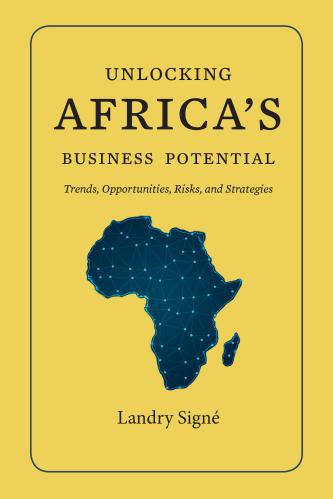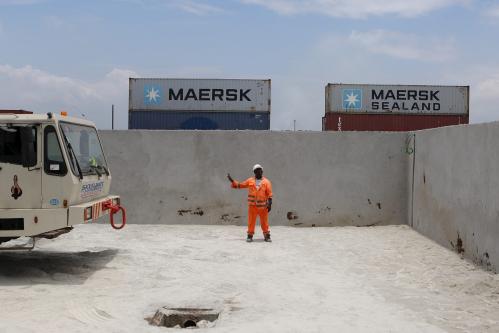Venture capital is an important source of funding for accelerating early-stage startups, empowering entrepreneurs, and encouraging innovations that facilitate economic development, poverty reduction, and job creation. According to a recent report by the African Private Equity and Venture Capital Association (AVCA), the venture capital (VC) and entrepreneurial landscape in Africa is experiencing rapid growth. Emanating from the continent’s robust macroeconomic progress from 2000-2016—which helped develop a favorable economic environment—the combination of a growing consumer base, external inflows of investment, and entrepreneurial business solutions addressing African consumer needs and structural problems has accelerated VC investments in Africa to record highs in 2019.
Figures 1 through 3 display the value and volume of VC transactions in Africa from 2014-2019 and the investment size of the VC deals, both of which have experienced significant growth. The authors attribute the significant expansion in the value of VC transactions in 2019—nearly double that of 2018 (Figure 2)—to Africa’s burgeoning startup ecosystem. A variety of countries have pursued policies that enable a conducive business environment for startups and small businesses. In fact, Senegal and Tunisia have recently enacted VC-friendly legislation, while Rwanda, Ghana, and Mali are currently pursuing similar policies. However, the majority of VC transactions in Africa are relatively small, as 65 percent of VC deals attract less than $5 million investments (Figure 3). Compared to VC deals in the United States over the same time period, Pitchbook, a capital markets research firm, reports that VC investments under $5 million compose roughly 10 percent of all VC deals in the United States.
Figure 1. Number of VC deals in Africa, by year
 Source: African Private Equity and Venture Capital Association, “Venture Capital in Africa: Mapping Africa’s start-up investment landscape,” 2020.
Source: African Private Equity and Venture Capital Association, “Venture Capital in Africa: Mapping Africa’s start-up investment landscape,” 2020.
Figure 2. Value of VC deals in Africa, by year
 Source: African Private Equity and Venture Capital Association, “Venture Capital in Africa: Mapping Africa’s start-up investment landscape,” 2020.
Source: African Private Equity and Venture Capital Association, “Venture Capital in Africa: Mapping Africa’s start-up investment landscape,” 2020.
Figure 3. Share of VC deals in Africa by volume, by deal size range, 2014-2019
 Source: African Private Equity and Venture Capital Association, “Venture Capital in Africa: Mapping Africa’s start-up investment landscape,” 2020.
Source: African Private Equity and Venture Capital Association, “Venture Capital in Africa: Mapping Africa’s start-up investment landscape,” 2020.
As seen in Figures 4 and 5, African VC is dominated by several industries and investors. In fact, the authors find that the composition of African VC deals by volume is concentrated in financials, information technology (IT), and consumer discretionary (nonessential goods and services). In terms of value, consumer discretionary and financials constitute more than half of African VC deal value. North America holds a considerable share of African VC investment, with Europe and Africa trailing behind: Combined, these three regions account for 75 percent of investments in African VC transactions. The authors find that, as Africa’s economic growth has accelerated and international investors’ interest has grown, local African investors have emerged to provide “home-grown financing solutions” and develop local venture capital firms.
Figure 4. Share of number and value of VC deals in Africa, by sector, 2014-2019
 Source: African Private Equity and Venture Capital Association, “Venture Capital in Africa: Mapping Africa’s start-up investment landscape,” 2020.
Source: African Private Equity and Venture Capital Association, “Venture Capital in Africa: Mapping Africa’s start-up investment landscape,” 2020.
Figure 5. Share of investors participating in VC deals in Africa by region, 2014-2019
 Source: African Private Equity and Venture Capital Association, “Venture Capital in Africa: Mapping Africa’s start-up investment landscape,” 2020.
Source: African Private Equity and Venture Capital Association, “Venture Capital in Africa: Mapping Africa’s start-up investment landscape,” 2020.
The authors also find that the geographic distribution of VC deals within Africa is quite heterogeneous: Indeed, Figure 6 reveals that the share of VC transactions by volume is roughly similar between eastern, western, and southern Africa, and the share of VC transactions by value is dominated by multiregional transactions with startup firms that operate across the continent. Notably, there is a stark deficit in both value and volume of transactions in Central Africa. Unfortunately, the authors do not provide any insights explaining this phenomenon. In terms of VC deal value and volume by country, the report indicates that three countries—South Africa, Kenya, and Nigeria—dominate the African VC landscape and capture, respectively, 21 percent, 18 percent, and 14 percent of VC deal volume. Combined, those three countries constitute more than half of all VC deal volume on the continent.
Figure 6. Share of number and value of VC deals in Africa, by region, 2014-2019
 Source: African Private Equity and Venture Capital Association, “Venture Capital in Africa: Mapping Africa’s start-up investment landscape,” 2020.
Source: African Private Equity and Venture Capital Association, “Venture Capital in Africa: Mapping Africa’s start-up investment landscape,” 2020.
The growth of venture capital investment, as well as private equity investment, in Africa demonstrates the evolving nature of external financial inflows to the continent, where the value of foreign direct investment surpassed the value of official development assistance in 27 countries in 2017. With such a favorable long-term economic outlook, growing middle class, and new massive market under the “world’s largest free-trade area,” the authors surmise that Africa’s economic potential makes it an increasingly attractive investment destination for investors seeking “high-growth businesses with long-term impact.”
For more on investment in Africa, read “Figures of the week: Private investment trends in sub-Saharan Africa,” “Figure of the week: Trends in mergers and acquisitions in Africa,” “Figure of the week: Foreign direct investment in Africa,” “Placing investment at the center of Africa’s development strategy,” and AGI Senior Fellow Landry Signé’s book: “Unlocking Africa’s Business Potential.”
The Brookings Institution is committed to quality, independence, and impact.
We are supported by a diverse array of funders. In line with our values and policies, each Brookings publication represents the sole views of its author(s).








Commentary
Figures of the week: Venture capital trends in Africa
April 21, 2021